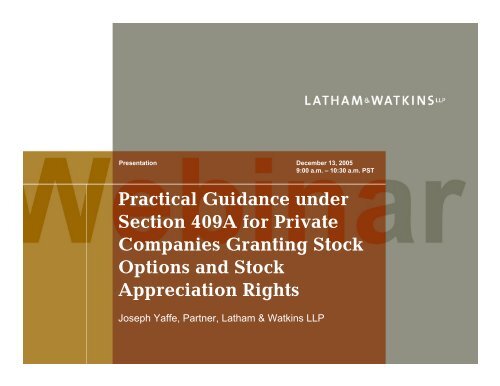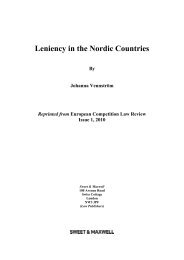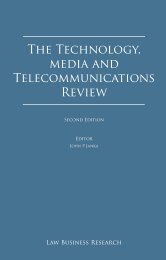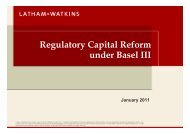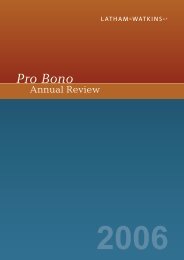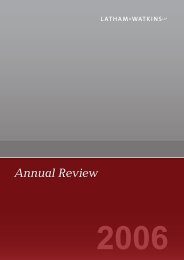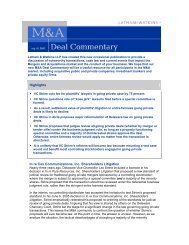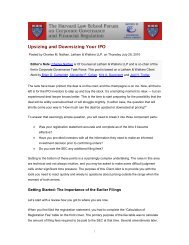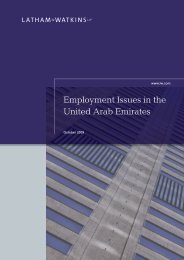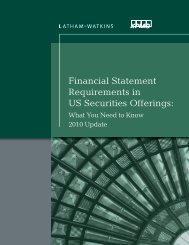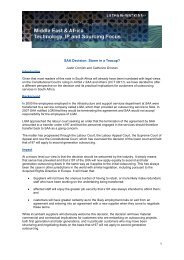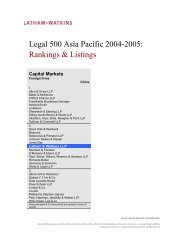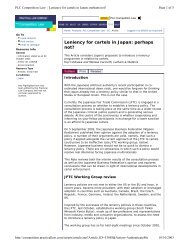Practical Guidance under Section 409A for ... - Latham & Watkins
Practical Guidance under Section 409A for ... - Latham & Watkins
Practical Guidance under Section 409A for ... - Latham & Watkins
- No tags were found...
You also want an ePaper? Increase the reach of your titles
YUMPU automatically turns print PDFs into web optimized ePapers that Google loves.
Presentation December 13, 20059:00 a.m. – 10:30 a.m. PST<strong>Practical</strong> <strong>Guidance</strong> <strong>under</strong><strong>Section</strong> <strong>409A</strong> <strong>for</strong> PrivateCompanies Granting StockOptions and StockAppreciation RightsJoseph Yaffe, Partner, <strong>Latham</strong> & <strong>Watkins</strong> LLP
Questions & AnswersDuring the event, <strong>for</strong>ward yourquestions to:<strong>409A</strong>.Questions@lw.com
<strong>Section</strong> <strong>409A</strong>Background• <strong>Section</strong> <strong>409A</strong> was added to the Internal Revenue Code inOctober 2004, as part of the American Jobs Creation Act• Intended to regulate nonqualified deferred compensationplans (NQDCPs) in the wake of Enron and increasedconcern over “excessive” executive compensationThe Problem• <strong>Section</strong> <strong>409A</strong> applies to many more arrangements beyond“traditional” nonqualified deferred compensation plans,including certain nonstatutory stock options and stockappreciation rights (SARS, collectively stock rights)<strong>409A</strong>.Questions@lw.com3
<strong>Section</strong> <strong>409A</strong>History• <strong>Section</strong> <strong>409A</strong> was added to the Internal RevenueCode in October 2004• In December 2004, the IRS issued Notice 2005-1,providing initial guidance with respect to theapplication of <strong>Section</strong> <strong>409A</strong>• October 4, 2005, proposed regulations are issuedregarding the application of <strong>Section</strong> <strong>409A</strong><strong>409A</strong>.Questions@lw.com4
<strong>Section</strong> <strong>409A</strong>• <strong>Section</strong> <strong>409A</strong> applies to NQDCPs• What’s at stake? (I):If a NQDCP with any employee, consultant ordirector is subject to <strong>Section</strong> <strong>409A</strong> and does notcomply with <strong>Section</strong> <strong>409A</strong> requirements, theservice provider will:• Be immediately taxed on vested non-complyingdeferred compensation plus interest from the dateof the original deferral of compensation; and• Be taxed an additional 20%<strong>409A</strong>.Questions@lw.com5
Stock Rights• In<strong>for</strong>mally, the Treasury Department hasexpressed its concern that absent regulation,stock rights may be used to circumvent <strong>Section</strong><strong>409A</strong>• The Treasury Department opted not to exempt allstock rights from <strong>Section</strong> <strong>409A</strong>• As a result, stock rights are only exempt from<strong>409A</strong> <strong>under</strong> limited circumstances<strong>409A</strong>.Questions@lw.com6
Stock Rights• New Rule: A stock right to purchase servicerecipient common stock is exempt from <strong>Section</strong><strong>409A</strong> if:• the exercise price of the option or base price <strong>for</strong> theSAR equals or exceeds fair market value (FMV) ofthe <strong>under</strong>lying stock on the date of grant;• the stock right has no other feature <strong>for</strong> the deferralof compensation beyond the exercise date; and• with respect to SARs, the amount payable <strong>under</strong>the SAR is not greater than the difference betweenFMV of the <strong>under</strong>lying stock on the date of grantand FMV on the date of exercise<strong>409A</strong>.Questions@lw.com7
Stock Rights• Other Exempt Rights to Purchase Stock• Incentive Stock Options (ISOs) are not subject to<strong>Section</strong> <strong>409A</strong>, however:• ISOs must be granted at FMV to qualify as ISOs, whichstandard is likely to converge with the <strong>409A</strong> rulesdiscussed below• The subsequent modification of an ISO (by, <strong>for</strong> example,amending it to extend the period within which it can beexercised after termination of employment) or failure tocomply with the minimum ISO share holding requirementsmay cause it to become a nonstatutory option subject to<strong>409A</strong>• Employee Stock Purchase Plans (423 Plans) arenot subject to <strong>Section</strong> <strong>409A</strong><strong>409A</strong>.Questions@lw.com8
Stock Rights• What’s at stake? (II)• For stock rights not exempt from <strong>409A</strong>• Immediate taxation <strong>for</strong> the stock right recipient uponvesting instead of at exercise (or later); and• 20% additional tax• Stock rights exempt from <strong>409A</strong> remain subject to“regular” tax rules – taxation at exercise• The IRS has not yet provided guidance on how tocalculate the tax that a stock right recipient willrecognize upon vesting of a non-exempt stock right<strong>409A</strong>.Questions@lw.com9
Valuation of StockThe Most Significant Issue Facing PrivateCompanies Granting Stock Rights: What is FMV?The proposed regulations provide guidance <strong>for</strong>purposes of valuing stock in connection with settingstock right exercise prices <strong>for</strong>:• Public companies; and• Private companies<strong>409A</strong>.Questions@lw.com10
Public CompaniesFMV may be based on:• the last sale be<strong>for</strong>e or first sale after the grant;• the closing price on the trading day be<strong>for</strong>e or the trading dayof the grant; or• any other reasonable basis using actual transactions in suchstock as reported by such market and consistently appliedFMV may also be based on average selling prices <strong>for</strong> aperiods within the 30 day period pre- and post-grant;provided that the commitment to grant the stock right usingsuch a method is used consistently and is irrevocably madebe<strong>for</strong>e the beginning of the specified period<strong>409A</strong>.Questions@lw.com12
Private CompaniesWith respect to private company stock (that is notreadily tradable on an established securitiesmarket), FMV must be:“[A] value determined by the reasonable applicationof a reasonable valuation method.”The determination whether a valuation method isreasonable, or whether application of a valuationmethod is reasonable, is made based on a facts andcircumstances analysis as of the valuation date.<strong>409A</strong>.Questions@lw.com13
Private CompaniesThe proposed regulations list factors that, asapplicable, are to be used in determining FMV <strong>under</strong>a reasonable valuation method:• The value of tangible and intangible assets of thecorporation;• The present value of future cash-flows of thecorporation;• The market value of stock or equity interests insimilar corporations and other entities engaged inbusinesses substantially similar to those engagedby the corporation;• Control premiums, lack of marketability and• “Other relevant factors”<strong>409A</strong>.Questions@lw.com14
Private Companies• Preferred stock liquidation preferences are notexpressly included in the list of factors that are tobe considered• A valuation method is not reasonable unless allavailable in<strong>for</strong>mation material to the value ofcorporation is considered<strong>409A</strong>.Questions@lw.com15
Private Companies• Use of a previously determined value will not bereasonable if determined on a date more than 12months earlier• Use of a previously determined value will not bereasonable in any event, if it does not take intoaccount material in<strong>for</strong>mation that becameavailable after the prior valuation• The consistent use of a valuation method <strong>for</strong> othernon-compensatory purposes is a factor supportingthe reasonableness of such valuation method<strong>409A</strong>.Questions@lw.com16
Presumptions• The proposed regulations place the burden ofdemonstrating that FMV is reasonable on thecompany unless the company consistently uses apresumptively reasonable valuation method• The proposed regulations provide three presumptivelyreasonable valuation methods:• Independent Appraisal• “Start-Up Company” Exception• Formula Price• Presumptions are rebuttable only if grosslyunreasonable<strong>409A</strong>.Questions@lw.com17
Independent Appraisal• The valuation must be per<strong>for</strong>med by anindependent appraisal• The appraisal cannot be as of a date more than12 months be<strong>for</strong>e the date of grant of the relevantstock right• The valuation will be presumed reasonable untilsubsequent events occur that have a materialeffect on stock value<strong>409A</strong>.Questions@lw.com18
“Start-Up Company” Exception• Only applies to a private corporation that hasconducted business <strong>for</strong> less than 10 years• The valuation needs to:• be made reasonably and in good faith;• be evidenced by a written report;• take into account the factors to be considered indetermining FMV;• be per<strong>for</strong>med by a person with “significant knowledgeand experience or training in per<strong>for</strong>ming similarvaluations;” and• be made with respect to stock not subject to any put orcall rights (other than right of first refusal and certainrepurchase rights that are “lapse” restrictions <strong>under</strong> theInternal Revenue Code)<strong>409A</strong>.Questions@lw.com19
“Start-Up Company” ExceptionThe Start-Up Company Exception is notpresumptively reasonable if as of the time thevaluation is applied (i.e., the grant date of a stockright) the corporation or optionee may reasonablyanticipate that the corporation will <strong>under</strong>go a changein ownership or control or IPO within 12 monthsfollowing the event to which the valuation is applied<strong>409A</strong>.Questions@lw.com20
Formula Price• Formula cannot lapse or expire over time (e.g.,book value)• Reasonable only if used consistently <strong>for</strong> allvaluations of the stock (including regulatoryfilings, loan covenants and transactions involvingthe issuance or repurchase of the stock)• Presumption does not apply <strong>for</strong> a stock rightexercisable <strong>for</strong> stock that can be transferredwithout regard to the <strong>for</strong>mula price<strong>409A</strong>.Questions@lw.com21
Service Recipient StockIn order to be exempt from <strong>409A</strong>, stock rights must beexercisable <strong>for</strong> Service Recipient StockStock is defined as:• A class of common stock that, as of date of grant, isreadily tradable on an established securities market, or ifnone, has the highest aggregate value of anyoutstanding class of common stock, or a class ofcommon stock substantially similar to such class of stock• Stock cannot be preferred stock<strong>409A</strong>.Questions@lw.com22
“Service Recipient”“Service Recipient” is defined as:• The corporation or other entity <strong>for</strong> which thegrantee is providing services• Any corporations or other entities that are relatedthrough at least 50% ownership interest (valueand voting)• In limited circumstances (e.g., joint venturearrangements), ownership can be as low as atleast 20%<strong>409A</strong>.Questions@lw.com23
ModificationsA modification of a stock right, other than anextension or renewal of a stock right, is consideredthe granting of new stock right• The new grant must be “remeasured” <strong>for</strong> <strong>409A</strong>purposes – it must have an exercise or base pricethat is at or above FMV on the date of suchmodification• If exercise price or base price is below FMV on thedate of such modification, the stock right will not beexempt from <strong>Section</strong> <strong>409A</strong><strong>409A</strong>.Questions@lw.com24
Modifications“Modification” means:• A direct or indirect reduction of the exercise priceor base price of the stock right (i.e., a repricing);• An addition of a deferral feature; or• An extension or renewal of the stock right<strong>409A</strong>.Questions@lw.com25
Extensions and RenewalsIf stock right is extended or renewed:The stock right is considered to have had anadditional deferral feature from the date of originalgrant<strong>409A</strong>.Questions@lw.com26
Not ExtensionStock right is not considered extended if the extension isnot beyond the later of:• December 31st of the calendar year in which grantwould have expired in the absence of such extension; or• The 15th day of the third month following its normaltermination or expiration dateTRAP – Stock rights that are amended through adoptionof an employment or change in control agreementproviding <strong>for</strong> extended exercisability in certaincircumstances<strong>409A</strong>.Questions@lw.com27
Not ModificationChanges that will not be treated as a modification:• Shortening of the period during which stock right is exercisable• Addition of the ability to use previously acquired stock to pay theexercise price• Addition of the ability to withhold stock to pay employment taxes orincome tax• Employer’s exercise of discretion with respect to transferability ofthe stock right• Acceleration of exercisability of stock right (note, however, thatacceleration of exercisability of stock right that is considereddeferred compensation <strong>under</strong> <strong>Section</strong> <strong>409A</strong> may constitute animpermissible acceleration of a payment date <strong>under</strong> <strong>Section</strong> <strong>409A</strong>)<strong>409A</strong>.Questions@lw.com28
Rescission RightIf inadvertent modification results from a change oradoption of a new agreement, employer can rescindthe change to avoid coverage <strong>under</strong> <strong>Section</strong> <strong>409A</strong> ifthe change is rescinded by the earlier of:• The date the stock right is exercised; or• December 31st of the calendar year during whichsuch change was made<strong>409A</strong>.Questions@lw.com29
Effective Dates For <strong>Section</strong> <strong>409A</strong><strong>Section</strong> <strong>409A</strong> is effective with regard to stock rights grantedin the following periods:• Stock rights granted be<strong>for</strong>e October 4, 2004 that vested byDecember 31, 2004 are not subject to <strong>Section</strong> <strong>409A</strong> (regardlessof exercise price) unless modified• Stock rights granted below FMV after October 3, 2004 that werevested as of December 31, 2004 are subject to <strong>Section</strong> <strong>409A</strong>unless granted in accordance with the company’s past practices• Stock rights granted below FMV that were not vested as ofDecember 31, 2004 are subject to <strong>Section</strong> <strong>409A</strong>• Stock rights granted after December 31, 2004 with regard tocommon stock that is not service recipient stock are subject to<strong>Section</strong> <strong>409A</strong>• Stock rights granted with regard to preferred stock that were notvested as of December 31, 2004 are subject to <strong>Section</strong> <strong>409A</strong><strong>409A</strong>.Questions@lw.com30
What Should You Do?• Assess current stock right grant practices: confirm thatstock rights are not being granted at below FMV• Consider use of a presumptively reasonable valuation methodgoing <strong>for</strong>ward• Evaluate whether stock rights are granted with respect tostock of the “service recipient”• Assess whether outstanding stock rights that were unvestedas of December 31, 2004 were granted below FMV• Discuss with legal counsel any potential modifications tooutstanding stock rights, or modifications made to stockrights that were unvested as of December 31, 2004<strong>409A</strong>.Questions@lw.com31
What Should Employers Do?• Corrective Actions <strong>for</strong> stock rights subject to <strong>Section</strong> <strong>409A</strong>• Exercise by December 31, 2005• By December 31, 2005, cancel the stock right in exchange either<strong>for</strong> stock or cash equal to the intrinsic (“spread”) value of the stockright• By December 31, 2006, increase the exercise price of the stockright to the FMV as of the original date of grant• If the company intends to pay the stock right recipient <strong>for</strong> thedifference between the original exercise price and FMV on the date ofgrant, any such payment must be made by December 31, 2005• Amend the stock right to comply with <strong>409A</strong> by December 31, 2006• Will require that the stock right be exercised within 2-1/2 months afterthe year in which it vests or otherwise in compliance with <strong>409A</strong>requirements <strong>for</strong> specified payment dates<strong>409A</strong>.Questions@lw.com32
<strong>Section</strong> <strong>409A</strong><strong>Latham</strong> & <strong>Watkins</strong> Attorney Contactswww.lw.comBostonDavid A. Gordon+1-617-633-5700HamburgGötz Wiese+49-40-41 40 30MilanMichael S. Immordino+39 02-85454-11Northern VirginiaEric L. Bernthal+1-703-456-1000ShanghaiRowland Cheng+86 21 6101-6000BrusselsAndreas Weitbrecht+32 (0)2 788 60 00Hong KongMitchell D. Stocks+852-2522-7886MoscowAnya Goldin+7-501-785-1234Orange CountyDavid W. Barby+1-714-540-1235Silicon ValleyJoseph M. Yaffe+1-650-328-4600ChicagoRobin L. Struve+1-312-876-7700LondonStephen Brown+44-20-7710-1000New JerseyDavid J. McLean+1-973-639-1234ParisChristian Nouel+33 (0)1 40 62 20 00SingaporeMark A. Nelson+65-6536-1161FrankfurtJörg Soehring+49-69-60 62 60 00Los AngelesJames D.C. BarrallDavid Taub+1-213-485-1234New YorkJed W. BricknerBradd L. Williamson+1-212-906-1200San DiegoDavid C. Boatwright+1-619-236-1234TokyoDavid L. Shapiro+81-3-6212-7800San FranciscoGregory P. Lindstrom+1-415-391-0600Washington, D.C.David Della Rocca+1-202-637-2200<strong>409A</strong>.Questions@lw.com33
Although this seminar presentation may provide in<strong>for</strong>mation concerning potential legal issues, it isnot a substitute <strong>for</strong> legal advice from qualified counsel. The presentation is not created or designed toaddress the unique facts or circumstances that may arise in any specific instance, and you should notand are not authorized to rely on this content as a source of legal advice and this seminar materialdoes not create any attorney-client relationship between you and <strong>Latham</strong> & <strong>Watkins</strong>.<strong>409A</strong>.Questions@lw.com34


